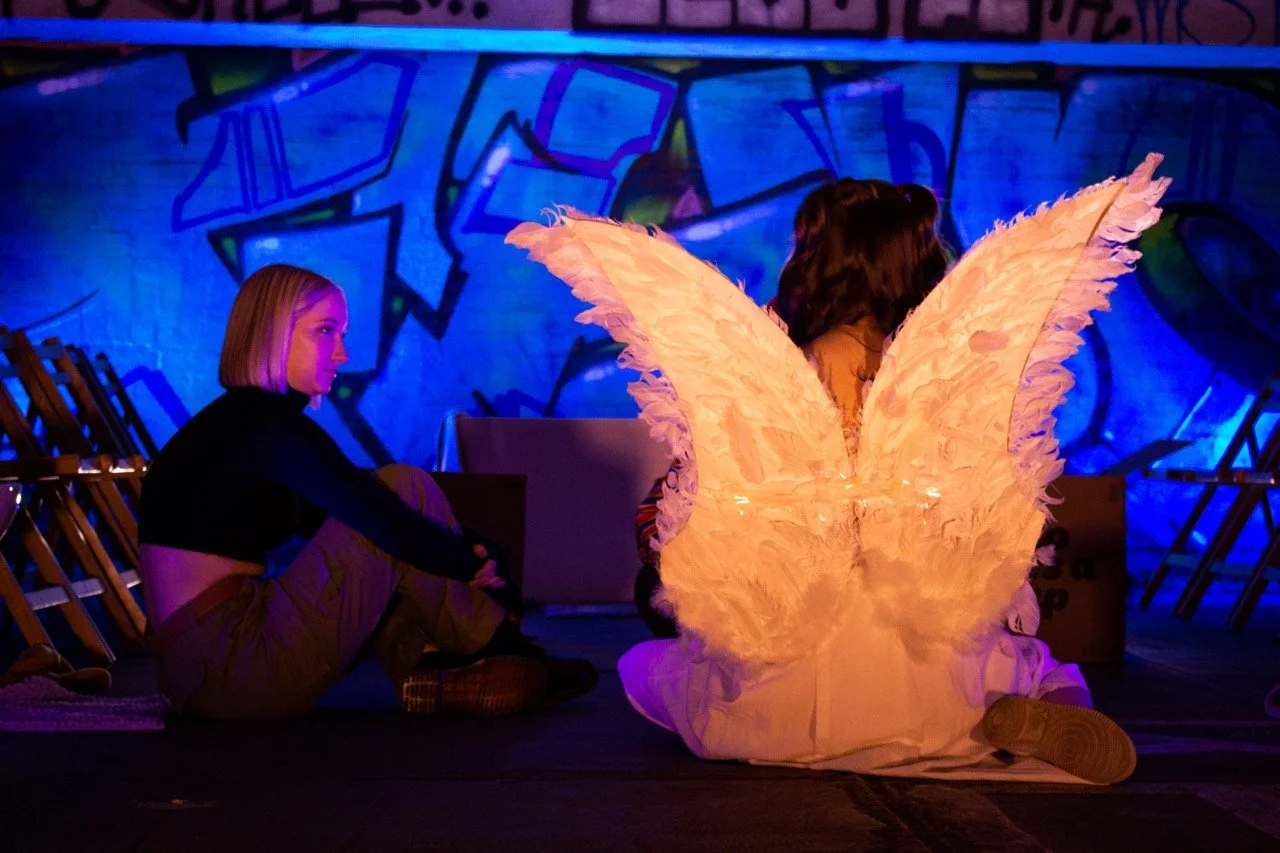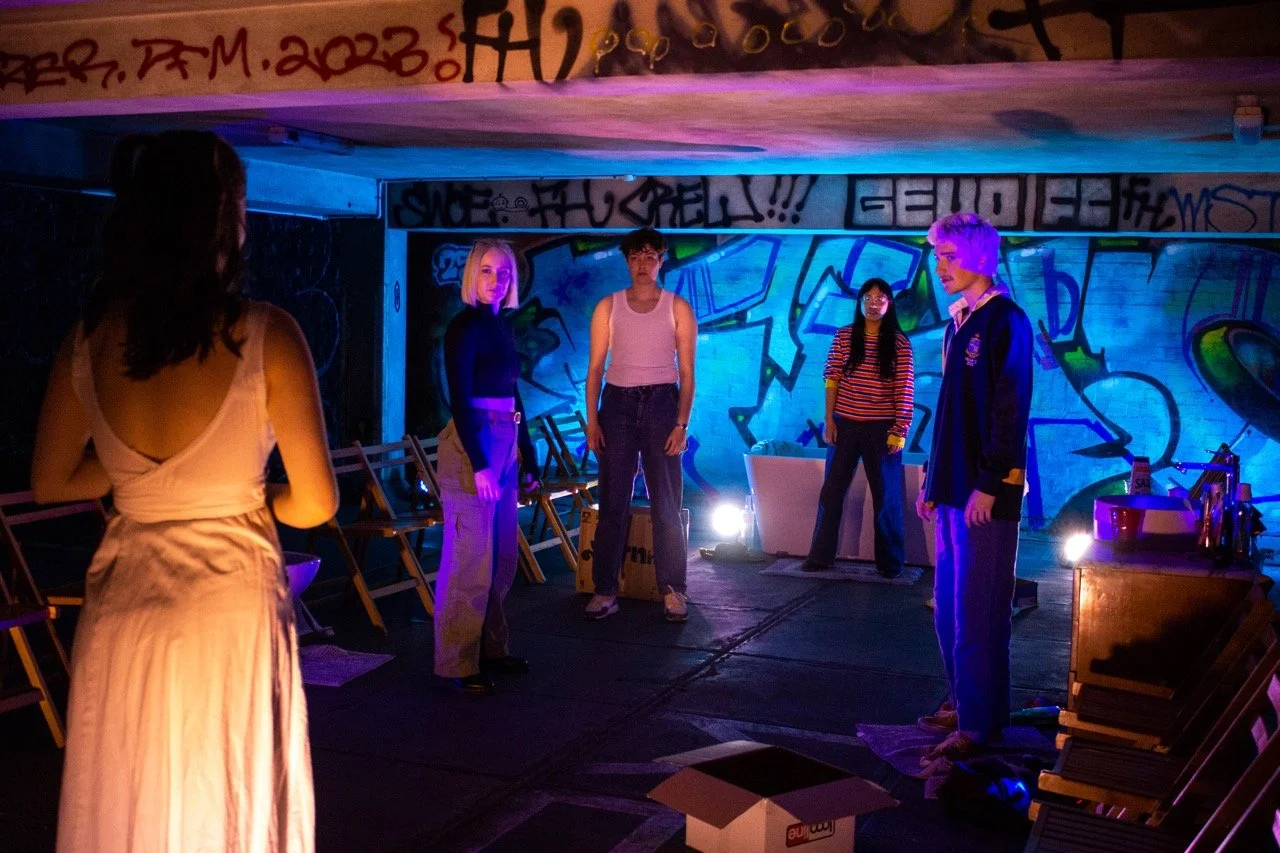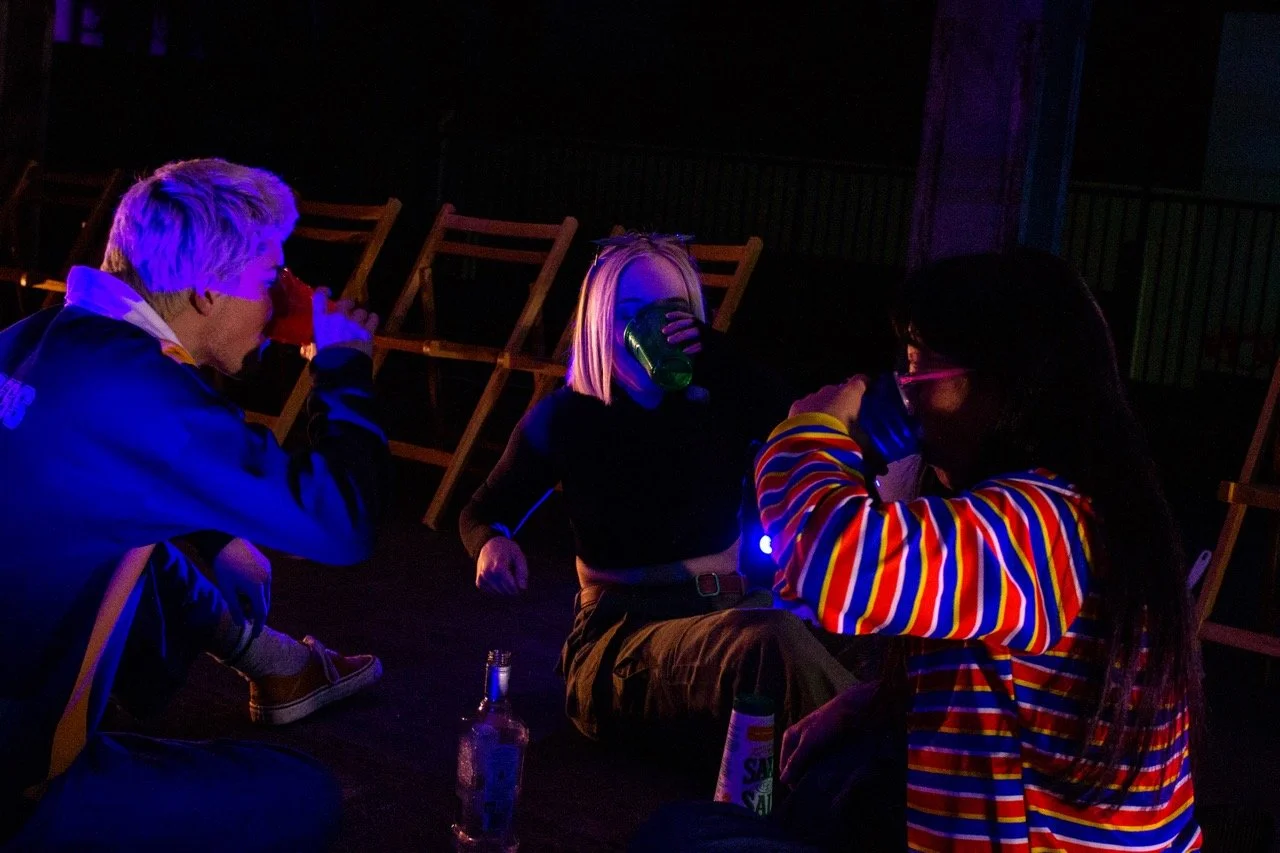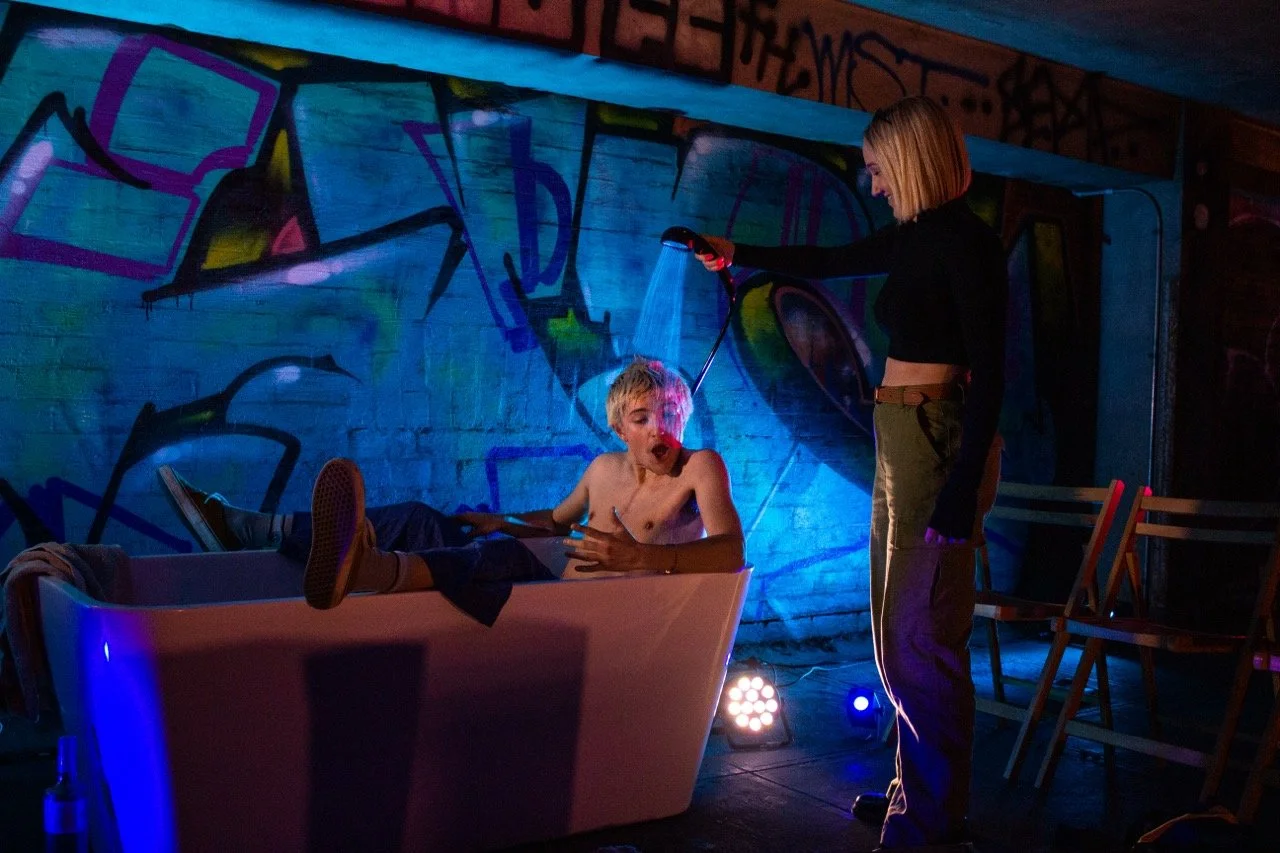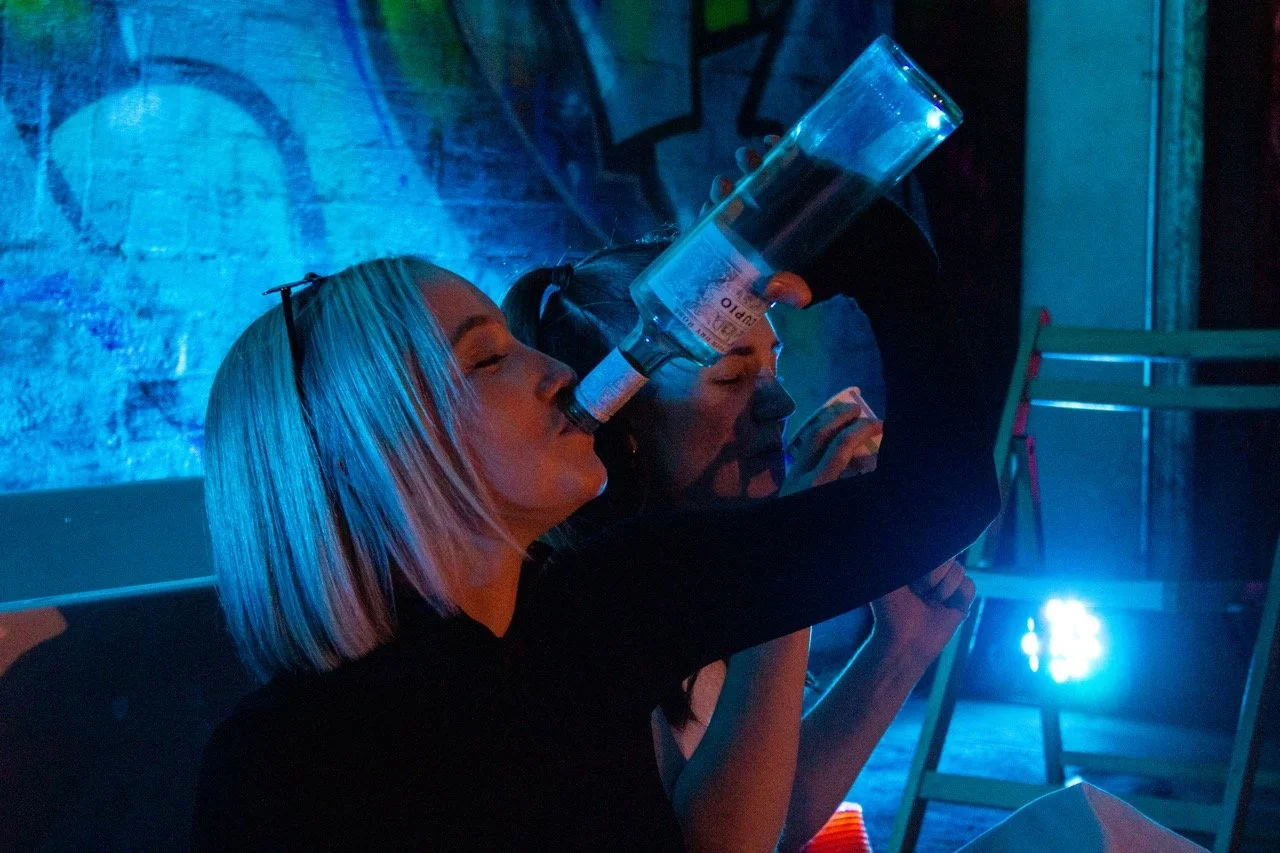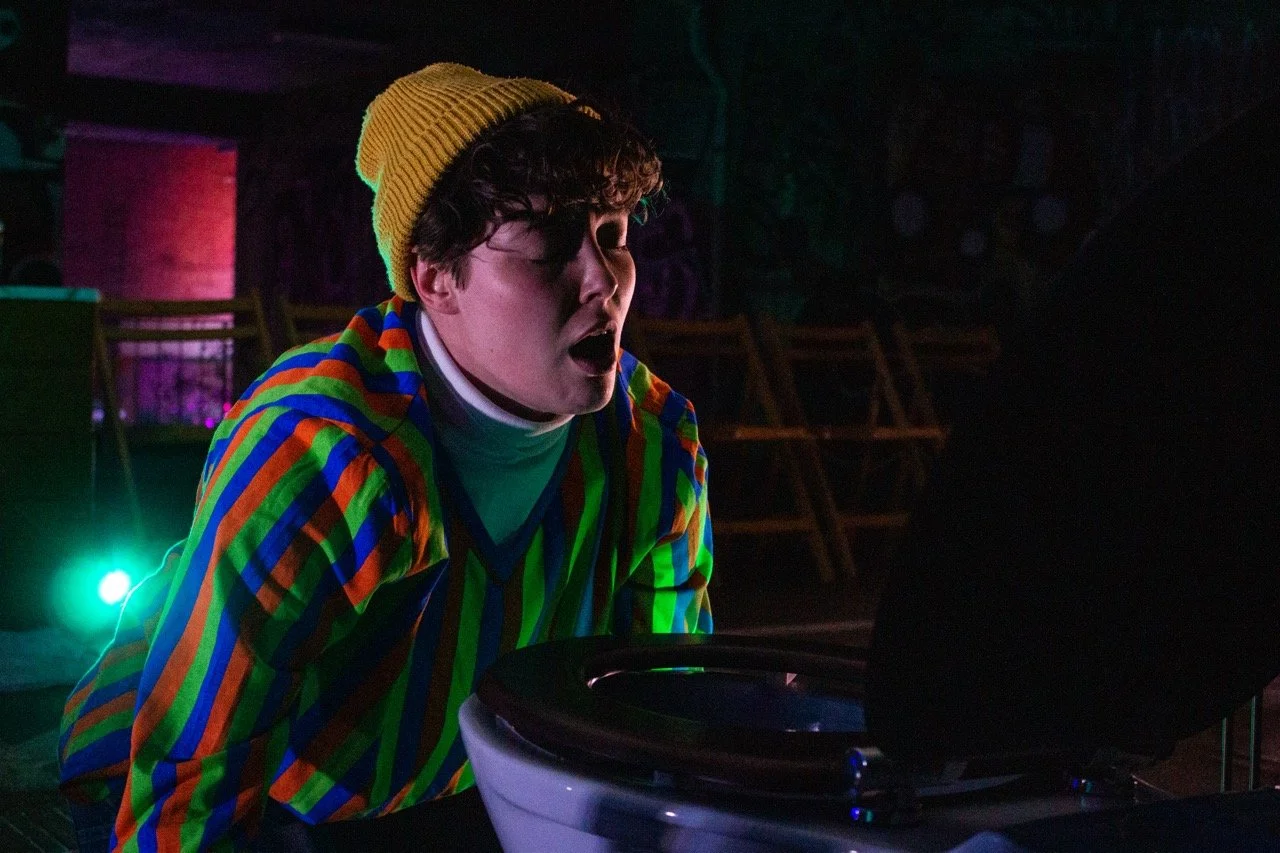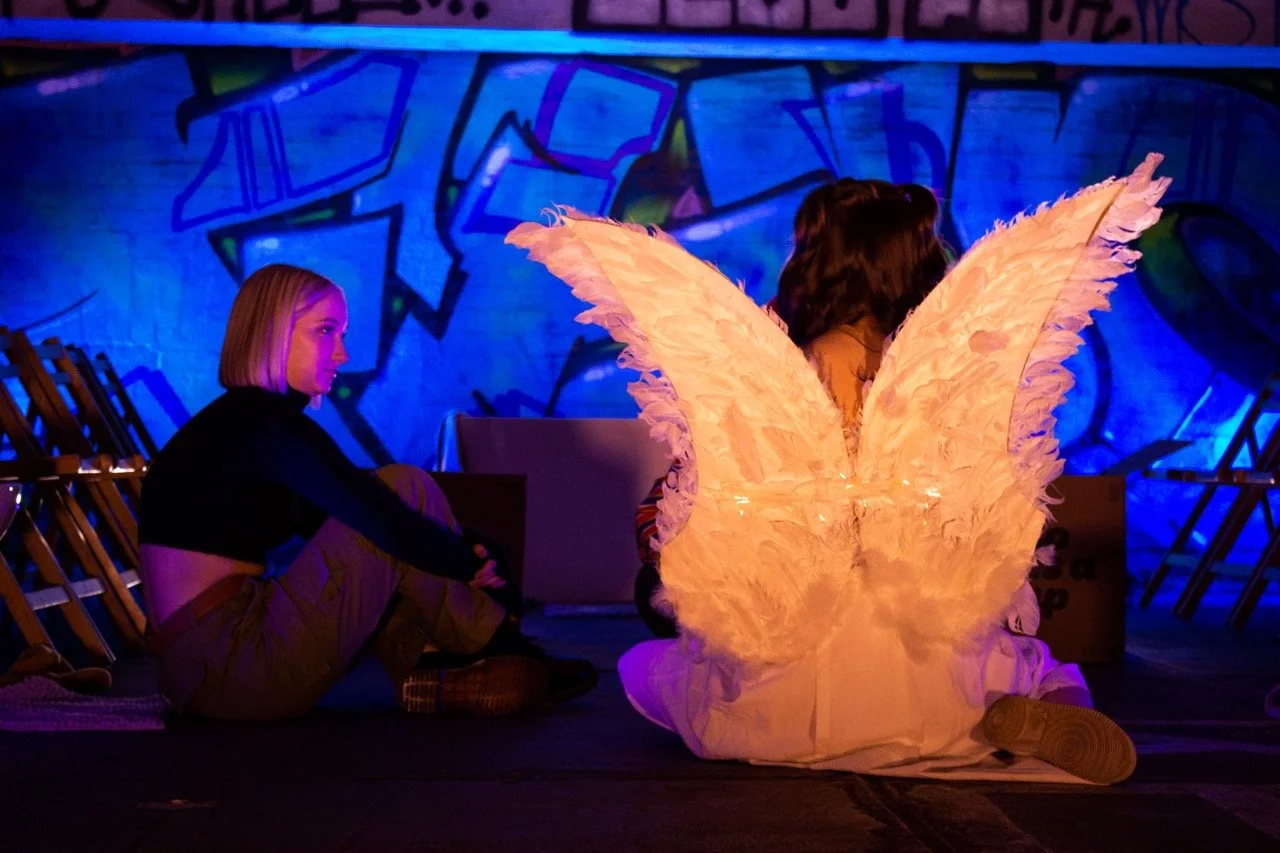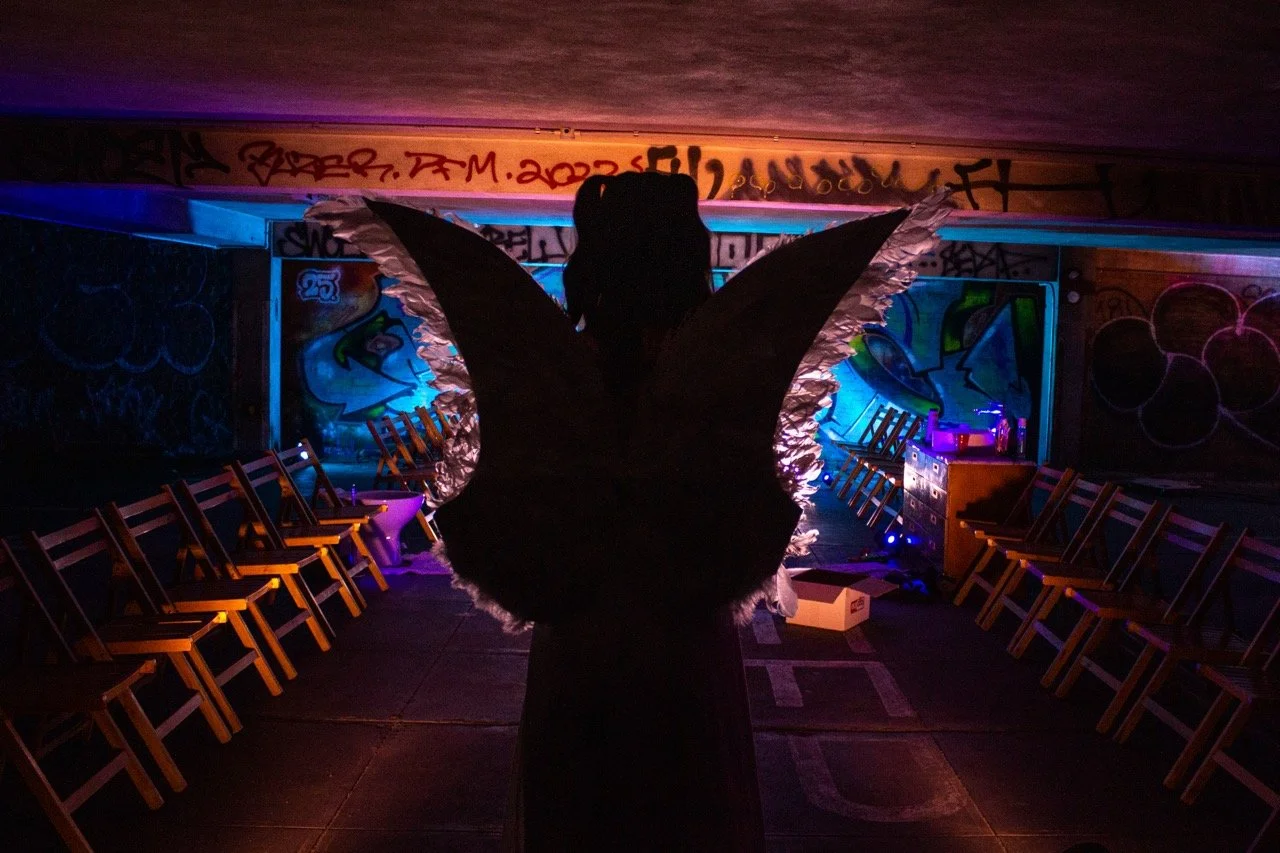Essay: I promise this is about ‘I Promise This Isn't About You (Even If It Seems Like It Is)’ (even if it seems like it isn't)
Written by Sarah Matthews, Directed by Carly Watson, Dramaturgy by Blake Hohenhaus
Essay By Martha Latham
I wonder what the process was like for Promise.
I wonder how tight their budget was.
I wonder how little they had and how much they achieved with that.
I wonder if they had a budget of $300.
I wonder if they found the toilet and bath and faucet by breaking into an abandoned home and stealing it.
7 years ago, I did a show at Sydney Fringe where the whole set would Babushka doll inside itself in order to fit everything inside my tiny little 2006 Volkswagen Golf so I could drive it up to Sydney.
Would I have been more impressed by Promise if I knew these things?
Would I have been more impressed by Promise if I knew how much blood they wrung from the stone?
I wonder if the actors felt respected.
I wonder if the tech rehearsal went much longer than expected.
I wonder what went wrong in tech.
I wonder if maybe, for one of the actors, this was the first time in a long time that they were acting again.
I wonder if the director received a bad review years ago that they can't shake the thought of.
The first review of my work was when I was five years old. It said:
“The spasming of the bedridden toadfaced chemokid is also pants-wettingly funny”.
Would I have been more impressed by Promise if I knew these things?
Would I have been more impressed by Promise if I knew the context of what they carried onto stage?
I was going to start by saying “My earliest memory of a house party was…”
The reality is that I cannot remember. All those youth house parties blur together into one big mush.
Key memories that pop out though:
Stealing a kiss from the girl I had a huge crush on for about a year. Real slow burn stuff. We'd both say hello and stare at each other in Math class when the other wasn't looking. I was dressed in a homemade ghostbusters costume. I do not remember what she was dressed as. I remember the kiss felt awesome. It was only a peck but it was the first kiss I wanted. I also remember the person who had a crush on me had seen the whole thing. I remember having an awkward conversation that night about how it wasn't because she was a girl and they were a boy. It was because I didn't find them attractive.
The crush is now married with a child. We don't chat.
The crushed now gets paid big bucks with Qantas. We still chat. My mum still has framed the charcoal artwork they did of me.
I remember the guy who I absolutely hated in high school feeling really ill in a hot tub and then raising his hands to his face slowly. Then vomiting into his hands, having it explode across his entire face as a result and then drip into the hot tub where me, his then girlfriend and like four other people were sitting. Then he got out of the hot tub, walked over and dived into the pool to clean himself up, absolutely soiling two separate bodies of water.
He's now some bigwig in the government. We don't chat
His ex-girlfriend is now in France? I think? We also don't chat.
I remember when I was hooking up with a friend during a small party. It was really small, like maybe 5 people. A mutual friend of ours/their roommate came by and knocked on the door loudly and asked what we were doing. We said we were watching tv. She was like “well that's really fucking anti-social”. It was a weird vibe. I felt guilty and started to get dressed, but my friend was like “no, fuck them it's fine”. My brother thinks our mutual had a crush on me and was trying to break the whole thing up. I don't really know what happened.
I don't know what either is up to. They both have me blocked.
I remember picking up a girl I was casually seeing from a party. She got in the car with her friend and both were completely silent. Any question I asked was met with dead stares. I drove them both home in silence, took nearly 30 minutes. I remember thinking “This is it. I'm never seeing this girl again”. The next day she woke me up crying and apologising. She told me they had too much weed and thought they could communicate telepathically.
I'm dating the girl now and we live together with two rabbits. We still chat.
The other is now one of my closest and most supportive friends. We all moved to Melbourne together during COVID and spent most of the lockdown together. We still communicate telepathically.
Does Promise have a life after Fringe? The cast and crew and producers have worked untold hours (presumably for free or a profit split). Do we think they made money on the show? More money than working at a bar? Do we think the 400 (?) people who saw it is enough to cement its longstanding legacy within the culture of Melbourne. Will it influence and shape the work of other artists? Did it make someone feel seen and understood and spoken for? Did it make enough people feel seen and understood and spoken for to make all that labour worth it?
Is Promise tour ready? It has a bathtub, a toilet, and a sink. That shit can fit in a van easily. It was performed in a car park. There's heaps of car parks all over the place. 5 performers though, that's gonna get expensive.
Is it a show that people in other cities will want to see? Can you convince people who aren't your friends and family to attend? Can you prove the value of your work to a set of aging programmers who manage a variety of venues who are all running out of money?
I mean running out of money isn't quite true. There'll always be enough money for a programming team. Just there isn't any money right now for programmed artists. See, we need a team of people to be given free tickets to shows across the fringe festival, to nod and smile and schmooze and feel important. Then we need a team of people to tell all those artists we simply don't have any money. The arts right now is struggling, you see. You probably don't get the ins and outs of it, you're just an artist. You need a desk and a laptop and an office and a water cooler and a $60,000 salary to get the ins and outs of it. I’ll simplify it enough so your little no desk, no laptop, no water cooler brain can understand.
Venues need to make money in order to operate. The money coming in needs to be more than the money going out. They wouldn't be able to operate without that money. Does that make sense?
That's why Fringe needs to take $2449. They wouldn't be able to operate without that money.
That's why GoGet needs to take $220. They wouldn't be able to operate without that money.
That's why Bunnings and Officeworks need to take $983. They wouldn't be able to operate without that money.
That's why programmers and producers and judges need to take $756 in free tickets. They wouldn't be able to operate if they had to spend that money.
That's why the actors and creatives get paid whatever is left. That's why you have to beg photographers and videographers to work at discounted rates. That's why Martha can work for free.
We can all operate without that money.
The industry is in a tough spot right now but we’ll get through it. Somehow.
Am I getting too old to enjoy stories about young people? I thought I was pro young people but as I get older and I see the kinds of things young people want, some primal part of me rears its head and screams:
“NO! RETREAT! RETREAT TO YOUR OWN KIND! ISOLATE, ISOLATE, ISOLATE! MAKE A BUBBLE WITHIN YOUR COMMUNITY AND ABANDON ANYTHING NEW!!”
I enjoyed I Promise This Isn't About You (Even If It Seems Like It Is) for the most part. I didn't like the title (I keep forgetting it). I didn't like that the stage was so large (the fun part of bathrooms at a house party is how little room there is).
Yeah, actually let me splash some opinions about staging. I think there were two missed opportunities to really capture the ~vibes~ of a house party:
The stage should have been cut in half, with half being the actual bathroom and the other half being the hallway. That way you get so much extra dramatic irony by having the audience see characters approaching (and characters listening in on conversations) before they actually enter the bathroom.
The amount of room the actors had to play with meant it never felt claustrophobic. No one got locked out of the bathroom. No one got trapped by the fact that it doesn't take too much body to block access to leaving a bathroom. No one got overwhelmed by trying to find a quiet spot and soon having it filled with 7 bodies like a clown car with a shitter in it.
None of that affected the play though. Plus, you'd probably fuck the experience for half the audience.
Maybe have it in the round? Maybe the actors have to push through the audience to get to the bathroom? Then we'd all feel much more like voyeurs listening in on conversations not meant for us?
Look, all of this doesn't matter. I think the point I'm making is that for a lot of the play I didn't feel the stakes. Everything felt so small and temporary. Don't get me wrong, I'm not saying this stuff doesn't feel like a big deal when you're 22. It's just that, I've lived through these parties and now I have a desk and an office and a laptop and a water cooler and a $90,000 salary and I know that all that stuff comes out in the wash. To me, Promise felt like I was watching some teenagers make a big deal out of nothing.
This year was my first time returning to directing after almost 4 years. It was really scary. When it was all over I felt like a huge failure.
I think the play we made was really good. Amazingly good considering the fact we had like 5 different rehearsal rooms, I still had a full time job, we were completely unfunded, I could only pay everyone about $700 in profit share, I didn't do auditions and we had a total of 3 hrs bump-in and then 3.5 hrs tech time. Also, we used fire on stage.
I think I did everything mostly right. Everyone had a good time, felt safe, and the play was really strong considering the facts.
Considering the facts.
Considering the facts.
But nobody says “it was amazing how much blood you wrung from the stone!”. Nobody says “given the context, that was a masterpiece!”.
This is, of course, to be expected. I don't go to Kmart and see some useless piece of plastic and think “Well, I don't need or want this product but I bet the person who made it was really nice. I bet the person who made it gave their employees lots of time off and paid them well and supported them through their tough times. I bet the person who made this happened to get a hard diagnosis half-way through development and that stifled the time they had to work on the product, get good feedback and really rework it”.
I think “I don't want or need this product”.
The thing is, what are we left with if these are our only tools to assess the things we buy? In Kmart, it's mass produced items made under unethical labour arrangements that are made to work just well enough to be worth buying and just cheap enough that you don't complain when they break a year later.
In theatre, it's art that is safe. Art from other countries. Artists with artists for parents. Award-winning theatre companies winning Fringe Festival awards. Artists leaving the industry and becoming real-estate agents and consultants and bank tellers.
I'm not saying we need to start enjoying bad art. I'm saying we need to start shopping ethically. I want programmers and producers to ask me how my show was made, how I treated my cast, and how I made sure the show I made didn’t exploit anyone.
But if they started asking those questions, they wouldn’t have anything to buy.
Good growth in an industry comes from the equal and inconsistent application of two levers. Support and pressure.
Pressure looks like competitive opportunities only given to a handful of people. It looks like 1 star reviews. It looks like friends telling friends their work was a fucking mess. It looks like a strong, well-paid industry of theatre critics. It looks like calling out the return of performers people feel unsafe around. It looks like high expectations for our mainstage theatre companies. It looks like legislation that ratifies high minimum wages and prevents sham contracting.
Support looks like low-admin grant applications. Support looks like a full-bodied and broad philanthropic network. Support looks like free educational workshops for artists. Support looks like buying tickets to shows you know you won't like. Support looks like the ATO looking the other way. Support looks like programmers in waged positions PAYING FOR THEIR FUCKING TICKETS. Support looks like in-kind venue access. Support looks like Ireland's recent announcement of a UBI for artists. Support looks like clear, well thought out feedback.
Presenters, promoters, producers, artists, critics and audiences need to understand these levers if we ever want this industry to get better. We need to keep our ear to the ground, our eyes on the horizon and think critically about when to pull one lever and when to pull the other. Because if you fuck it up, it can have serious consequences. Both on the industry and on individuals.
Maybe that's why the response I mostly get from presenters, promoters, producers, artists, critics and audiences is neither support, nor pressure.
“We loved your play. It opened some great conversations between my friend and I. But touring a show is expensive and we don't have any money at the moment. Thank you so much though, the play was awesome!”
“Thanks for inviting us!”
“A really strong entry. We saw lots of plays and yours was a really good one.”
“You’re my friend! I'd see anything you made!”
“[Insert no response after two follow ups and a free ticket from person on a $110,000 salary]”
“Hi, nice to meet you my name is Martha and our pla-”
“Regional audiences won't like queer theatre.”
“Our play is about climate change, it’s actua-”
“They won't like plays about climate change either.”
For the most part this is fine. I don't expect an intense and thorough breakdown in order to better my craft from my mum. She's my mum.
But from artists? From critics? Yeah, I do. I expect feedback. I expect honesty. I expect advice.
From presenters and producers? Yeah. I expect a little bit of cultural leadership. I expect you to pull one of those levers. I expect you to support an actor and encourage them to trust their gut and believe in themself, only to have critics eat them alive. I expect you to apply pressure on an artist who’s really good at covering their cracks and who shatters and stops making art for 4 years as a result. I expect you to fuck up, apologise, pick up the pieces and try again.
What I wanted from Promise was young adults broken by the fact they had never felt grief like this before, they had never failed like this before and they lacked the tools to handle it. I wanted to see huge emotional messes. I wanted blood. There were moments when the play hit those notes and really sung.
The ending was one of these moments.
The lights slowly turning to a deep blue, Sav calling her mum over and over and over and always ending up at a message bank. She leaves a simple message each time, politely at first,
“Hey Mum, are you able to please come and pick me up? The plans have changed and I don't think I can stay the night. Please?”.
Under the geniality we can feel the desperation in her throat and we all collectively hold our breath and lean in.
“Hey Mum. Me again, could you call me back ASAP? I really don't wanna stay the night anymore and I'm not sure what else to do.”
By the third call the politeness, positivity and pretense is all gone. It's just desperation.
“Mum, I'm scared. Harry is so… angry. I'm worried. Mum please, I need you to pick me up”.
That moment was worth seeing the play for.
But for me, these moments were too far and few between.
When I was 23, I had a huge friend break-up. I happened to gain access to their private messages between each other and read them. I instantly regretted it. I told them what I'd done. They were upset (obviously) but the whole thing was probably fixable if I hadn't acted the way I did for the next year.
Following and unfollowing on Instagram. Subtle posting about how sad I was. Trying to move past it by ignoring the whole thing. Messaging their other friends, people I only tangentially knew, to try and find out what they were up to. Getting angry at them. Distancing myself and blocking them off entirely. More that I either don't remember or am too afraid to admit.
These weren't things I did because I was hurt. These weren't “my way of working through grief”. All this happened while I was studying my masters at NIDA (a place not known for its ‘support’ lever), COVID lockdowns and being back in the closet while I lived with my family after being out for almost 5 years.
I wasn't in control of myself. I was completely broken.
My doctor pushed my mood stabilisers from 50mg a day to 200mg a day. It didn't make a difference. My anxiety and depression had wormed its way out of my nervous system and into the core functionality of my brain.
I wanted to see these parts of my youth in Promise, but I wasn't there.
When I watched Trophy Boys I remember it being beloved by so much of the theatre crowd. Everyone talked about how relatable it was and how much it captured the feelings and frustrations of Australian women. The casual and veiled nature of sexism.
My highschool experience wasn't of a casual and veiled misogynistic debate team who wore blazers.
It was of a boy who got bashed while waiting for the bus because he did dance as an elective.
It was of that same boy quitting dance as a result. It was of that same boy bashing someone else for being openly gay.
I'm not saying Trophy Boys was bad. I'm not saying it didn't do anything to push forward the culture and to speak to people who needed to be spoken to.
I'm saying I couldn't relate to it. I'm saying I wasn't there.
I should feel the same about that moment at the end with Sav as I do about much of the play.
I should be saying “It's not a big deal, Sav, you're just 18. Sleep on the couch like you planned. It's probably 3am, your mum is never going to pick up. Deep breaths. Regulate your responses. Try to rest, even if you can't sleep, and in 3 hours your mum will come get you.”
But I'm not. I’m not thinking about my laptop, or my water cooler, or my office, or my salary, or my girlfriend, or my rabbits, or vomiting into pools, or bad presenters, or the future of art, or whether I'm getting old. My mind goes quiet and I'm there. I'm having a panic attack in a house party bathroom and I'm desperately trying to get my mum to pick up.
I Promise This Isn't About You (Even If It Seems Like It Is) played at the Trades Hall Carpark as part of Melbourne Fringe Festival 2025 from 8 - 12 October 2025. It was produced by Ryan Hamilton. Find their instagram @the.ryan.hamilton.
Images by Jaimi Houston
Martha thinks theatre is an incestuous cesspool. Luckily, she thinks incestuous cesspools are awesome. Come and play at the cesspool with her on her website sadgoldfish.com or her instagram.
This essay was generously donated by Martha. Pay her back by subscribing to our Patreon, or buying us a coffee.
